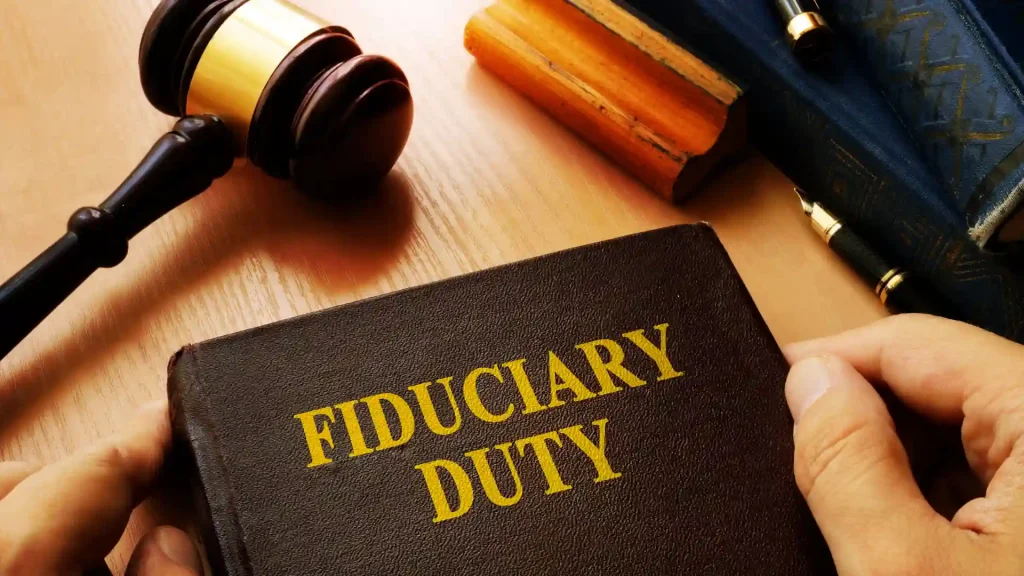
When an executor breaches their legal obligations, can you sue the executor for breach of their fiduciary duty in Texas as an estate beneficiary? What does the process of suing an executor look like? And what relief can you obtain for a breach of fiduciary duty—especially if you’re considering whether you can sue an executor for breach of fiduciary duty?
What Is the Executor’s Fiduciary Duty?
The executor of an estate has a fiduciary duty to act in the estate’s best interests and those of its beneficiaries. Key fiduciary duties that executors must fulfill include:
- Duty of Loyalty – Loyalty requires an executor to act in the estate’s and its beneficiaries’ best interests and prioritize their needs over the executor’s needs or wishes. This duty requires an executor to avoid conflicts of interest where the executor’s interests or needs may conflict with those of the estate and its beneficiaries. When an executor identifies a potential or apparent conflict of interest, they should disclose it to the beneficiaries and the court and either withdraw from the decision or obtain an informed waiver.
- Duty of Good Faith – The duty of good faith requires executors to act honestly, diligently, and lawfully. An executor must administer an estate to the best of their ability, making reasonable decisions or taking reasonable actions based on professional advice and the executor’s best judgment.
- Duty of Impartiality – An executor must not show favoritism to one beneficiary over another. The executor’s decisions should not favor one beneficiary to the detriment of others unless the decedent’s will directs a more favorable distribution for specific beneficiaries.
- Duty of Prudence – An executor must manage an estate prudently, which requires safeguarding and maintaining estate assets to prevent waste, depreciation, or damage. The executor must pay all debts and taxes owed by the estate. Furthermore, an executor should seek professional legal or financial counsel when necessary to help make prudent decisions—primarily since mishandling responsibilities can raise serious concerns, like “Can I sue an executor of an estate?”
Examples of Breach of Fiduciary Duty by an Executor
An executor may breach their fiduciary duty to an estate and its beneficiaries in various ways. Common examples of breaches of fiduciary duties by executors include:
- Misappropriation of Estate Assets – Executors can misappropriate estate assets by converting estate assets for themselves or by charging excessive administration fees. Misappropriation can also occur when an executor usurps a financial opportunity belonging to the estate for themselves.
- Mismanagement of Estate Funds – An executor may mismanage estate funds when they fail to locate and secure all assets, including bank accounts and investments. Mismanagement may also occur when an executor makes poor investment decisions with estate assets without consulting professionals for advice.
- Failure to Distribute Assets – Beneficiaries may have fiduciary claims against an executor who refuses to distribute inheritances without a good reason.
- Failure to Pay Debts and Taxes – Failing to pay the estate’s debts and taxes can expose the estate to significant financial liability, harming the estate and its beneficiaries’ legal interests.
- Failure to Maintain Estate Assets – An executor’s failure to maintain certain assets, such as real property, may constitute a breach of fiduciary duty when the lack of maintenance causes a depreciation in the asset’s value, reducing the beneficiaries’ inheritance.
- Showing Favoritism – An executor may distribute a larger share of the estate to particular beneficiaries than directed by the will or may allow specific beneficiaries to take personal items from the decedent’s estate while excluding other beneficiaries.
Legal Process for Suing an Executor

Beneficiaries can pursue legal relief for an executor’s breaches of fiduciary duty by filing an action in the probate proceeding to remove and replace the executor and obtain a compensation award for the estate’s or the beneficiaries’ losses. A beneficiary can begin the legal process for suing an executor by petitioning the probate court presiding over the estate administration. The petition should outline the allegations against the executor and describe what relief the beneficiary or beneficiaries want, such as the removal of the executor or an award of financial compensation. After serving the petition on the executor and other interested parties, such as other beneficiaries, the parties may engage in limited discovery before a court hearing where each side can present evidence, witness testimony, and legal arguments.
After considering the parties’ evidence and arguments, the probate court will decide whether the petitioner has proven that the executor breached their fiduciary duties. The probate court may remove the executor for breaching their fiduciary duties and replace them with another individual. Alternatively, the court can order the executor to take specific actions to remedy their breach, such as distributing assets. The court may also order the executor to compensate the estate or its beneficiaries for financial losses caused by the breach.
Contact Our Firm Today for Help Asserting Your Beneficiary Rights Against an Executor
When your loved one’s estate executor breaches their executor duty to beneficiaries, you need experienced legal counsel to protect your rights and interests. Our team is here to help you understand your rights and take the first step toward securing the necessary benefits. Contact Staubus, Blankenship, Legere and Walker PLLC today at (214) 833-0100 for a confidential consultation with a knowledgeable fiduciary litigation attorney to discuss your options for pursuing claims for executor negligence.






